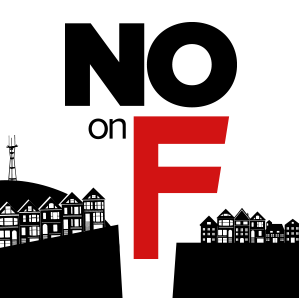Yes, the snarky Airbnb ad campaign was ill-conceived. However, don’t let it cloud your judgment about this ballot measure. I think Prop F should fail, and not for the reasons you’d expect.
Before we get into the merits of Prop F, I think it’s important to review the history.
In October of last year, the Board of Supervisors passed legislation that then-Supervisor David Chiu worked for two years to craft, regulating Airbnb and its competitors in order to restrict short-term rentals in the city. The new law was written in reaction to the dramatic effect that these companies are having on the city’s housing – both in rising rents and the number of units being taken off the permanent rental market. The law requires that hosts: (1) be permanent SF residents renting our their primary residence (i.e., no long distance landlords); (2) live on the property 275 days out of the year (limiting their short-term rentals to 90 days annually if they are renting out their entire house); (3) get a business license and register with the city; and (4) have at least $500,000 in commercial property insurance. As a part of the negotiations with the city over the Chiu legislation, Airbnb agreed to collect and pay the same taxes that hotels pay (called the Transit Occupancy Tax), which so far has amounted to $12 million.
 There are folks who are unhappy with the Chiu legislation, saying it didn’t go far enough. It’s housing rights activists, landlords, labor including the hotel workers union, and owners of hotels who are threatened by the competition. These strange bedfellows – who usually don’t agree on much – put Prop F on the ballot.**
There are folks who are unhappy with the Chiu legislation, saying it didn’t go far enough. It’s housing rights activists, landlords, labor including the hotel workers union, and owners of hotels who are threatened by the competition. These strange bedfellows – who usually don’t agree on much – put Prop F on the ballot.**
If Prop F passes, it would further restrict a short-term rental to 75 days out of the year (instead of 90), and the cap would apply to individual rooms rented, not just whole units. It would require Airbnb, its competitors, and their individual hosts to file reports with the city every three months. The law would prohibit the short-term rentals of in-law units and it would provide citizens with a private right of action to sue their neighbors if they suspect their neighbor is violating the law.
In the interest of full disclosure, I am an Airbnb user. I have been an occasional Airbnb guest since 2011, and I became a host in September. As a progressive who supports rent control and has many friends who have been evicted or priced out in the last year, I am sympathetic to the plight of folks who have been affected by the insane housing market in this city. But I also know a lot of people who are using the service as hosts, and in my experience – despite the ad campaign depicting a company replete with over-entitled tech bros – most hosts are just trying to survive in the city. They are making sacrifices to rent out rooms in their homes, to help pay the mortgage or to pay the bills between jobs.
To me, lowering the number of rental days from 90 to 75 would not be a big deal if it applied to entire units, but applying this cap to guest rooms is just wrong. If I am living in my house every day of the year, and just renting out a guest room whenever I need the extra cash, I shouldn’t be restricted to such a low number of days. I don’t oppose restricting the short-term rental of in-law units – the city should make it harder for property owners to remove these units from the permanent rental market. Reporting my hosting activities to the city every three months won’t be the end of the world, though this provision seems intended to make it harder for folks to use the service, and it will probably make some hosts quit. Requiring Airbnb and its competitors to report their user data is probably in violation of California’s new Electronic Communications Privacy Act and the U.S. Supreme Court’s ruling in City of Los Angeles v. Patel, and that provision would probably be struck down in court if the measure passes. The private right of action by neighbors? That scares me – encouraging neighbors to sue each other seems like a terrible idea.
I think the Chiu legislation should be given some time to do its thing; it has been in effect for less than a year. The law took years of meetings and public hearings and negotiations to arrive at something that most stakeholders could live with, and it has promise to solve the problems that short-term rentals have created. The Office of Short Term Rentals was just opened in July, and they started enforcing against scofflaw hosts in August, imposing a few hundred thousand dollars in fines already in just a few short months.
But the main reason I oppose this measure is this: Laws approved by ballot measure can only be amended by another ballot measure, making it nearly impossible to change it. And this is exactly the kind of law that needs to iterate over time. The products and services created by technology companies like Airbnb are constantly evolving – and the laws that regulate them need to be just as nimble. If Prop F passes, it sets these restrictions in stone, and the Board of Supervisors won’t be able to amend them. Any revision – no matter how small – will require another election cycle and another contentious and expensive battle for votes.
We should encourage the Board of Supervisors do its job: soliciting input from stakeholders and constituents, weighing the complicated elements of the law against the impacts they will have on the community. If you don’t like the way the current law is written, you should let your Supervisor know. Speak up, come to hearings, write emails, make calls. That’s the way it is supposed to work.
Please vote NO on F!
**Speaking of strange bedfellows, Senator Dianne Feinstein is not usually on the side of housing rights activists. So why does she support Prop F? It might have something to do with the 161-room hotel that she owns with her husband. Not saying, just saying.
